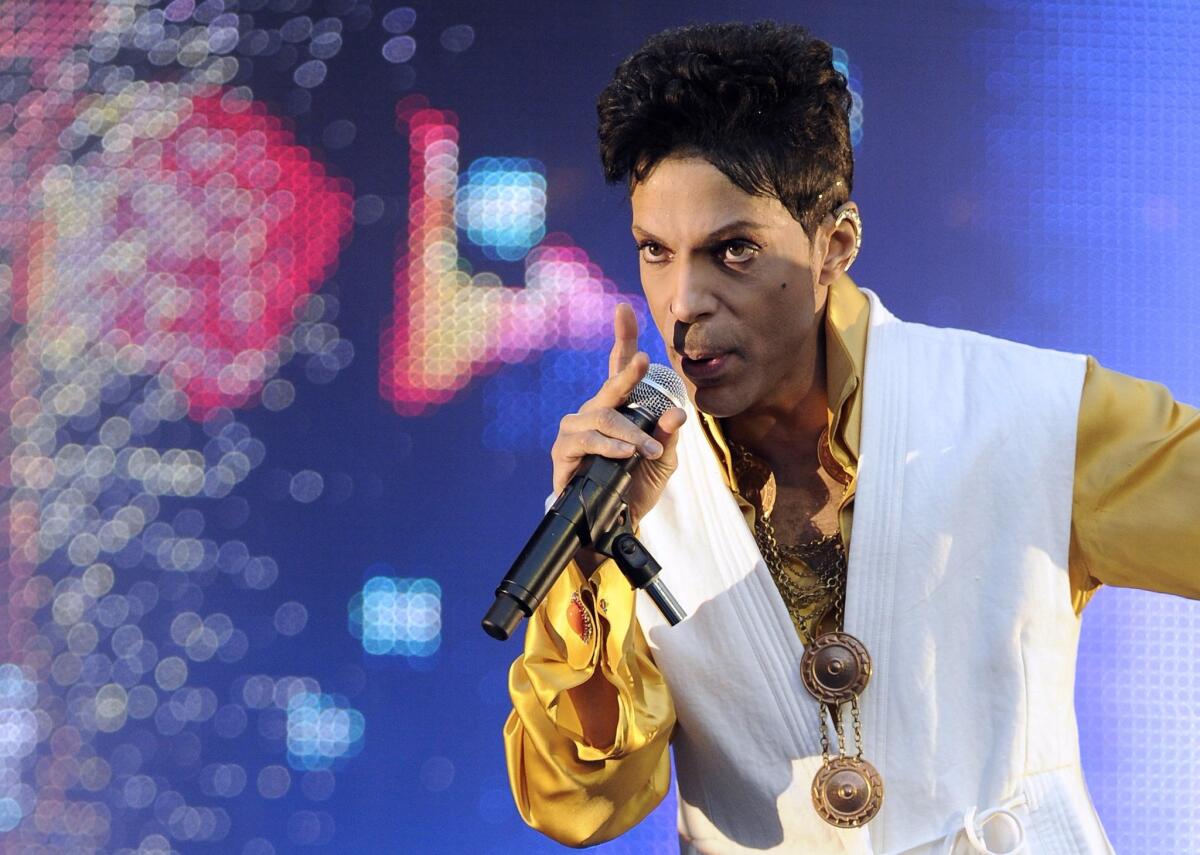Opinion: Prince was nobodyâs slave

Prince performs at the Stade de France in Saint-Denis, outside Paris, in June 2011.
âA genius, innovator, creator, family member, Prince will be truly missed,â the homepage of the Tidal music service declared Friday. âHe shared his creative vision and asked for nothing in return.â
Actually, one of the hallmarks of Princeâs career is that he insisted on getting something in return for his music.
This is, after all, an artist who famously performed with the word âSlaveâ written across his face -- his way of protesting his labelâs refusal to let him release his recordings on his own terms. That label, Warner Bros., balked at the volume of music Prince was churning out in the closing decades of the 20th century. The fight became so bitter, it led Prince to release music independently under a different name -- an unpronounceable glyph based loosely on the symbols for male and female -- until his contract with the label expired.
He ultimately won the control heâd sought, and history proved to be on his side. Warner Bros.â view, which was typical of the major labels at the time, was that the way to maximize revenue for an artist was to limit the amount of music he or she released. The arrival of the original Napster in 1999, however, marked the end of the era of blockbuster album releases. Million-selling albums were giving way to million-selling downloadable singles. More than ever, recorded music became a business of hits that were here today, forgotten tomorrow. That shift favors artists who release material steadily, rather than trying to make their work scarce.
Prince didnât exactly welcome the broadband era. He enforced his copyrights aggressively and expected his label partners to do the same; thatâs one reason for the absurd legal fight between Universal Music and the parent who uploaded a video to YouTube of her toddler cavorting around the kitchen to a Prince song.
Again, Prince was nobodyâs slave. He expected people to pay for his songs, and as a copyright holder, that was his right. And in addition to cracking down on unauthorized uses online, he was a pioneer in exploring how artists could use the Internet to distribute their own work for pay. Among other things, he created a subscription service in 2001 that granted exclusive access to new songs. (It shut down in 2006.)
At the same time, he balked at most of the online services that the major labels eventually embraced -- ones such as Spotify that stream unlimited amounts of music online for a low monthly fee -- because the compensation to artists was measly.
Heâs right about that, although the problem isnât necessarily intrinsic to the streaming business model. It also stems from the contracts artists sign with labels that pay them only a sliver of the royalties collected. But another factor is that free, ad-supported streaming, which Spotify uses to help sell its paid subscriptions, generates considerably lower royalties.
So Prince yanked his works off of Spotify and almost every other streaming service in July. The sole exception was Tidal, the outlet owned by rapper Jay Z, who says he pays 75% of Tidalâs revenues in royalties -- 5 percentage points more than the industry standard. According to some analyses, that has translated into Tidal paying significantly more per song streamed than Spotify does.
Yet Apple Music, which has a much larger user base (and so pulls in more revenue), appears to pay slightly more than Tidal. So Princeâs fealty to Tidal wasnât purely a numbers-crunching exercise; most likely, it was his effort to support a platform that artists controlled.
The consequence for music fans is that, unless theyâre Tidal subscribers, they canât engage in that peculiarly 21st century grieving exercise of revisiting an artistâs entire catalog. Theyâre stuck with whatever they have in their own collections, and the rare track that Prince allowed on YouTube: âBaltimore,â his response to the unrest sparked by the death of black Baltimore resident Freddie Gray while in police custody.
His music is a gift that will last for generations. Even if his estate never releases any of the hundreds of Prince songs he locked in a vault, the work already released constitutes a vast and rich collection of inventive and often compelling music. In the short term, though, the limited availability of those songs represents a bequest of a different kind. Itâs the fruit of his fight for a better business model for this generation of artists.

Follow Healeyâs intermittent Twitter feed: @jcahealey
More to Read
A cure for the common opinion
Get thought-provoking perspectives with our weekly newsletter.
You may occasionally receive promotional content from the Los Angeles Times.











